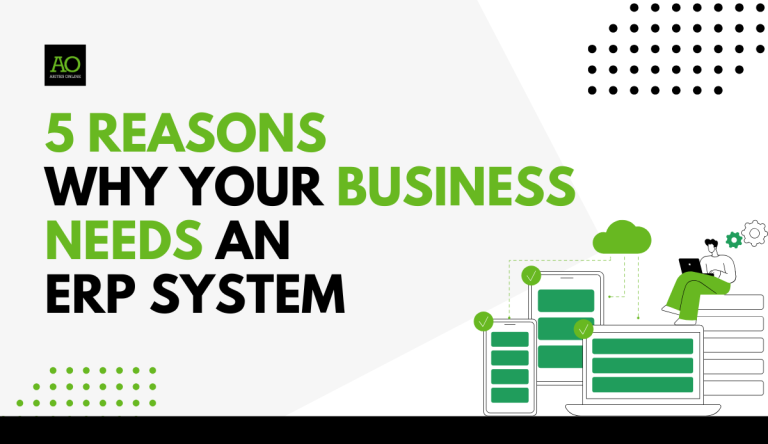ERP for Small Business: Everything You Need to Know
ERP for small businesses can bring about many benefits because most small and medium-sized businesses (SMBs) run on systems. Some are streamlined and efficient. Others are held together by spreadsheets, sticky notes, and sheer luck.
91% of medium to large businesses use ERP software. There’s a reason for that. ERP isn’t just for big corporations. It helps SMBs get organized, work smarter, and compete with larger businesses. Without it, inefficiency becomes a silent killer—missed orders, duplicate data, and costly mistakes add up fast.
What is ERP?
Enterprise Resource Planning (ERP) is a system that connects all your business operations into one platform. So, you won’t have to jump between different softwares daily.
An ERP system acts as the brain of your business. It collects, organizes, and processes data in real-time, making sure everything runs smoothly. Orders get processed correctly, inventory updates automatically, and reports are always accurate.
Still unsure? Read our blog on What is ERP.
Why SMBs Need ERP
Running a small business is hard. You’re juggling too many tasks at once, and inefficiencies sneak in before you even realize it. Orders pile up. Employees enter data manually, leading to mistakes. The numbers in your inventory system don’t match what’s actually in stock.
Having an ERP software for small businesses solves these problems by providing structure, automation, and visibility into your operations. It transforms the way you work.
- Centralized Data – All your business information is stored in one place. No more switching between different programs or losing track of key details.
- Error Reduction – Automation eliminates manual data entry mistakes. Orders go out correctly. Reports are accurate. Your team spends less time fixing errors.
- Scalability – ERP grows alongside your business. You get a solution that adapts to your business needs instead of replacing outdated systems every few years.
- Faster Decision-Making – Real-time reporting gives you instant insights into sales, expenses, and operations. You won’t have to wait until the end of the month to see what’s happening.
- Increased Productivity – Employees stop wasting time on repetitive tasks and focus on what matters. ERP systems automate processes which frees up valuable hours.
95% of companies report improved business processes after switching to ERP. That’s not a coincidence.
Challenges SMBs Face with ERP
ERP isn’t perfect. It solves a lot of problems but it also comes with challenges, especially for smaller businesses with limited budgets and resources.
Let’s break it down:
Customization Costs
ERP solutions aren’t one-size-fits-all. The more customization you need, the more expensive it gets. Some SMBs end up paying for features they don’t use or struggle to afford the ones they actually need.
Employee Resistance
Not everyone is comfortable with change or can’t adapt quickly, especially when it comes to technology. Employees who are comfortable with old systems might push back against learning something new. Without proper training and support, they can slow down adoption which is why it’s necessary to train your employees on a new system.
Long Implementation Time
ERP isn’t plug-and-play. It takes time to integrate with your existing processes. Data migration, system setup, and employee training can stretch over months. SMBs that don’t plan properly risk delays, disruptions, and unexpected costs.
How to Handle the Downsides
ERP challenges aren’t dealbreakers. With the right strategy, SMBs can overcome these hurdles and get the most out of their investment.
Dealing with Customization Costs
Start small. Instead of an expensive on-premise solution, go for a cloud-based ERP. It removes the need for costly hardware, lowers IT expenses, and offers a pay-as-you-go model. That way, you get the features you need without breaking the bank.
Handling Employee Resistance
Communication is key. Show employees how ERP makes their jobs easier—fewer manual tasks, better organization, and less frustration. Invest in proper training. Work with an ERP provider that offers ongoing support so your team isn’t left in the dark
Managing Long Implementation Times
Plan ahead. Define your business needs before choosing an ERP system. Work with a provider who understands SMB challenges and can streamline the setup process. Have a contingency budget in case of delays, and prepare your team for the transition.
How ERP Helps Different Industries
ERP isn’t just for manufacturers. Businesses across multiple industries use it to improve efficiency, reduce costs, and stay competitive.
Retail & E-commerce
Managing inventory across multiple sales channels is a nightmare without ERP. It tracks stock levels in real time, preventing overselling and stockouts. It also automates order processing, so customers get their products faster. Whether you sell online, in-store, or both, ERP ensures a seamless experience. People have seen a 25% increase in customer satisfaction thanks to improved order accuracy and better communication.
Healthcare
Medical organizations need accurate patient records and billing systems and scheduling capabilities which follow all regulatory standards. ERP software systems assist healthcare operations by centralizing information while cutting paper-based activities and enhancing cross-department collaborations. Healthcare providers and administrators obtain real-time patient information without delays or errors. Research shows that businesses using ERP systems have a 75% better compliance with industry regulations
Construction & Real Estate
Tracking budgets, contracts, materials, and deadlines need to be done carefully. ERP solutions help construction businesses to handle their projects efficiently, making sure of resource effectiveness and preventing mistakes. Real estate operations gain enhanced financial management with better systems for client-tracking.
Finance & Insurance
ERP automates financial reporting, ensures compliance, and improves customer relationship management. Instead of dealing with scattered data, businesses get a clear overview of accounts, transactions, and performance.
Hospitality
From hotel reservations to restaurant management, ERP keeps operations running smoothly. It connects front-desk operations, billing, and inventory so businesses can deliver better customer service without operational headaches.
Wondering what ERP system to choose? Read our blog on What is Odoo and how it can help you!
Why Choose Ariyes Online?
ERP works best when it’s customized to your business. That’s where Ariyes Online comes in. We don’t just install ERP software—we make sure it fits your operations, train your team, and provide ongoing support.
Our process includes:
- Consultation – We analyze your business needs and recommend the right ERP solution.
- Implementation – We handle the setup, data migration, and customization.
- Training & Support – We guide your team through the transition and provide continuous assistance.
Time to Get Started
Inefficiency costs money. Missed orders, duplicate work, and slow decision-making hold businesses back.
ERP fixes that.
Ariyes Online helps SMBs implement ERP systems that work—without the frustration. Contact us today.



